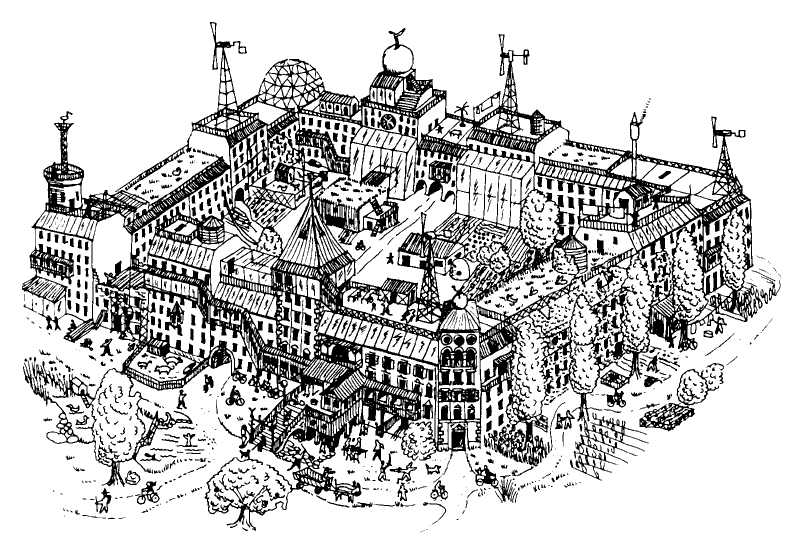Interview, P.M.

P.M. is the anonymous writer of the book bolo'bolo. He has managed to live parts of his utopian vision through his engagement with various cooperative housing and living projects in Zurich, the so-called "young" cooperatives. He recently wrote the The power of the neighborhood which analyses the main concepts developed in bolo'bolo in a more pragmatic and rigorous way
When you wrote bolo'bolo did you really imagine that one day part of this vision would be actually implemented?
Bolo'bolo was in fact just a list of ideas that I had found in different places. These suggestions are not really spectacular, so I was sure that some of it would become real.
How about the box, the death pill, and the duels? Have you completely abandoned those ideas?
The idea of the taku box was an attempt to illustrate the relationship of private property (that I consider essential) and the commons (that are even more important). I consider suicide a human right and I don’t think that humans are always loving and peaceful. If we imagine alternative social arrangements these should be so robust as to be capable of dealing with human imperfections. We shouldn’t try to „change people“, but to find more suitable arrangements among the people as they are: egoistic, sloppy, deceitful, unreliable.
Why did you choose to write anonymously?
Three years before bolo’bolo I had published my novel „Weltgeist Superstar“, that was based on good-night-stories collectively thought out in my community. So there was no individual author and I chose the most frequent initials of the Zurich phone book, P.M. This pseudonym stuck to me and I have used it henceforward.
Actually, do you remember how did you feel the period when you started writing bolo'bolo? How did everything start?
I wrote bolo’bolo when a European movement of space wars and squats in a number of cities (Amsterdam, Berlin, Vienna, Milano, Hamburg) had come to an end, this was in 1983. That was also the moment, when the so-called neoliberal rollback started worldwide. Most of my friends were very depressed, bolo’bolo should cheer them up.
Also something about the period between the book was published and when Kraftwerk1 did its first steps?
There is no direct connection between bolo’bolo and new collective housing projects like Karthago or Kraftwerk1. In Zurich there was a movement for affordable housing, out of which new cooperatives like Kraftwerk1 arose. When the squats had been terminated, we thought it was better to buy the houses instead of being thrown out of them by the police. That’s the idea of the cooperative: when you pool your resources you notice that you are not as poor and powerless as you thought.
When we first met you said that Kraftwerk1 did not turn out exactly as you expected. Could you elaborate? Which were the most important "mistakes" made? Did you managed to correct them in most recent projects?
No mistakes were made. Originally Kraftwerk1 should have been bigger – 700 persons instead of 250 like now – and on another site, closer to the city center. In our book „Kraftwerk1“ we make a thorough analysis of the urban development of Zurich and we proposed Kraftwerk1 as the beginning of a new type of economic system: making a living, not earning a living. To create such an internal economy you need a certain minimal size – maybe 500 persons – to make things like food logistics, diversity of activities and qualifications, collective infrastructures, viable. So Kraftwerk1, as it is, is a bit too small for an elaborate collective infrastructure. We just have a little shop, whose existence is always threatened. Instead of providing lodging and meals on an everyday basis, there is just a group of 30 people, who cook and eat together on Wednesdays. However there is a very good restaurant in our building – Brasserie Bernoulli. But this is managed commercially by an independent team.
I think at the moment one should not try to be too ambitious with alternative economic systems. There is the risk to become an avantgarde and to get out of touch with the mainstream. Projects should be perceived as normal. But it’s important to have a store of very ambitious concepts to measure your success.
There are now bigger cooperative projects – like mehr-als-wohnen (more than housing) where 1400 persons live. There you find a guesthouse for 20 persons. There are also initiatives to link up with farmers and to create a more comprehensive food logistics. But it remains to be seen how far they are able or willing to go.
Can you name an idea that you wouldn't expect that it would really work but it actually did? And the opposite: something that seemed easy but actually is more difficult than expected?
The site of Kraftwerk1 didn’t seem very attractive at the time (1999), so we were afraid that we couldn’t fill the building. It turned out that many more people want to live here, so that there has never been an empty flat. What seemed easy was to run our own restaurant cum shop as a collective infrastructure. But the team that was supposed to realize this fell apart, so that we had to rent out the spaces commercially. I still think that this should be possible to do in a future project (like NeNa1).
How would you imagine the project to evolve in the future? Give me an optimistic and a pessimistic version.
Kraftwerk1 is evolving furiously. We have already built a smaller project for 80 people and a bigger one for 350 (in the outskirts of Zurich). The cooperative has now close to 1000 members. What can be realized (always additionally to providing affordable and attractive housing) in every one of these projects depends on size, local situations and the initiatives of the members themselves. There is no compulsory Kraftwerk1-program. It’s all based on democratic decision making, voluntary work and pragmatic evaluation. People have jobs and not much time left for alternative fun and games.
If the economic pressure increases the resources for collective enterprises could shrink. If you have to work full time, you’re not going to help in the shop in the evening or to work on the fields of our agricultural cooperative ortoloco. Everybody will have to look after themselves, conviviality and cooperation will shrink. May-be, in a consecutive phase, when the going gets really tough, one might rediscover the potential of collective infrastructures. In theory, that should be the logical reaction. We’ll see.
Zurich, August 14th 2015
(to be continued)
